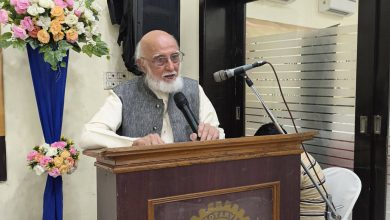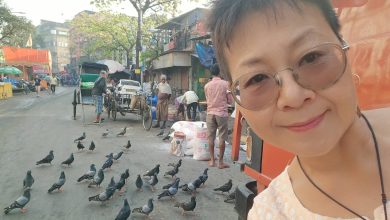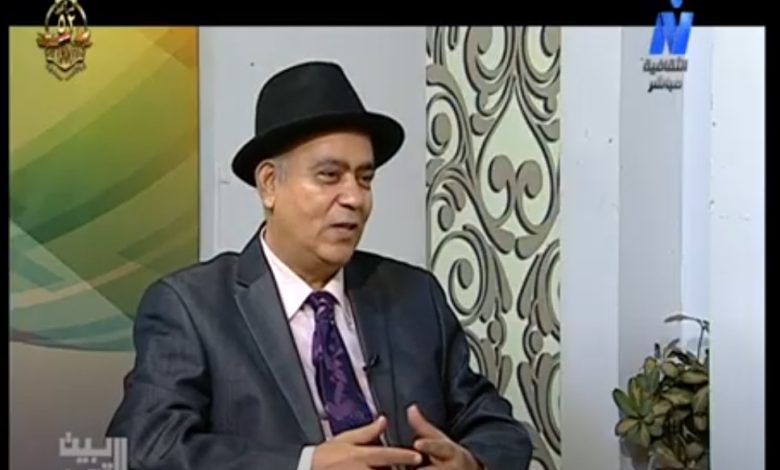
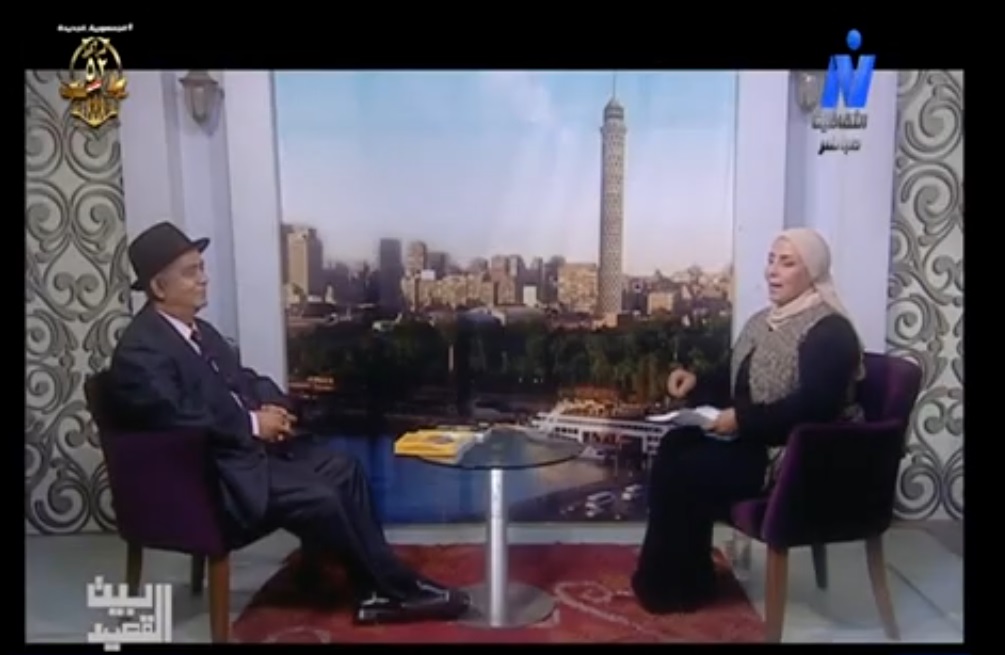 The Egyptian poet and novelist Ashraf Aboul-Yazid was hosted on the program “Bayt al-Qasid” (The House of Verse), presented on the screen of Nile Culture Channel of Egyptian Television by media anchor Dr. Suzan Fadaly, prepared by poet Mohamed Ramadan, coordinated by journalist Mohamed Aboul-Layl, and directed by artist Ihab Gamal.
The Egyptian poet and novelist Ashraf Aboul-Yazid was hosted on the program “Bayt al-Qasid” (The House of Verse), presented on the screen of Nile Culture Channel of Egyptian Television by media anchor Dr. Suzan Fadaly, prepared by poet Mohamed Ramadan, coordinated by journalist Mohamed Aboul-Layl, and directed by artist Ihab Gamal.
In her introduction, the host offered a brief portrait of Aboul-Yazid and his ever-traveling pen. He is a novelist and poet, a writer of travel literature and children’s books, and a translator. Since 1989, his works have spanned poetry, fiction, translation, children’s literature, travel writing, critical studies in fine arts, and cultural journalism. His writings have been translated into several languages, and his journeys across the globe have been captured with a watchful eye and a magnifying lens.
Since 1990, Aboul-Yazid has worked in cultural journalism. He received the Manhae Prize in Literature (South Korea, 2014) and the Arab Journalism Award for Culture (UAE, 2015). He served as president of the Asia Journalists’ Association (2016–2024), and is currently Secretary General of the African Journalists’ Conference.
He was Editor-in-Chief of AsiaN Arabic: The Future News Network, and now leads Silk Road Today as well as the Silk Road Creativity book series. A member of the Egyptian Writers’ Union, he has authored over 44 publications, ranging from novels and poetry to translations, studies, and children’s books. His works have been translated into Korean, Persian, Turkish, Spanish, German, English, Sindhi, Urdu, Azerbaijani, Serbian, and Malayalam. In 2021 he was awarded the Eurasian Literature Festival’s Gold Medal, and in 2025 was named Poet of Africa at the Silk Road International Festival in Dubai.
Early Steps in Journalism and Literature
Aboul-Yazid spoke of his early passion for journalism. As a boy, he loved correspondence; his letters to friends inside and outside Egypt were like single-copy magazines.
In 1983, he founded the magazine Shabab 2000, part of the “Master Press” cultural movement—independent publications outside official institutions and beyond the capital, akin to Sanabel, the magazine of the late poet Mohamed Afifi Matar. These periodicals introduced voices that would later become landmarks in contemporary Egyptian literature.
Poetry and Translation
Among his poetry collections are: Whisper of the Sea (Cairo, 1989), The Shells (Cairo, 1996), Memory of Silence (Beirut, 2000), Upon the Path of Death (Cairo, 2001), Memory of Butterflies (Cairo, 2005), and Poems (Dar Al-Nasher, 2024). He has also published translations of poetry and art criticism from English in specialized journals.
In 2002, Al-Shu‘ara magazine in Ramallah published his translation of the complete poems of the Greek poet Sappho. The program also broadcast a recorded performance of his poem A Street in Cairo, which he presented at the Cairo International Book Fair.
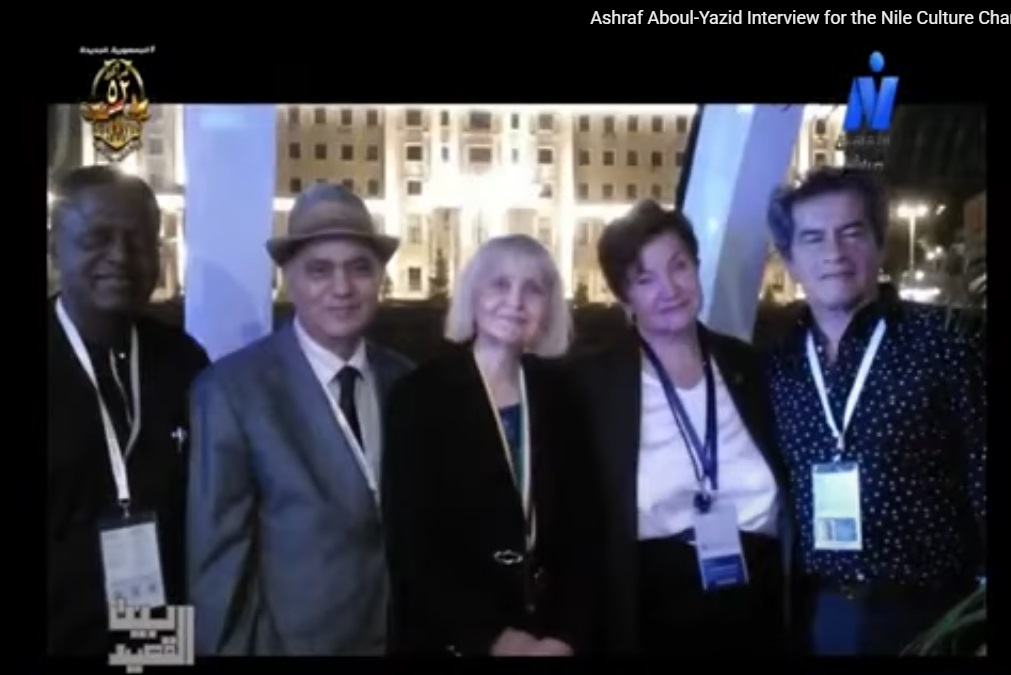
Moscow … Moscow
Reflecting on his most recent journey, Aboul-Yazid noted that though he had visited Russia ten times, it was his first real stay in Moscow. Previous trips had been brief transits en route to his beloved Kazan, the capital of Tatarstan: “I love Kazan and Kazan loves me; during my last visit I was a jury member at the Kazan International Film Festival.”
In Moscow, he attended two exceptional events: the World Public Assembly and the Second World Writers’ Congress, organized by the World Organization of Writers (WOW). (The interview and filmed segment about the Moscow journey, from minute 19:50 to minute 27:00)
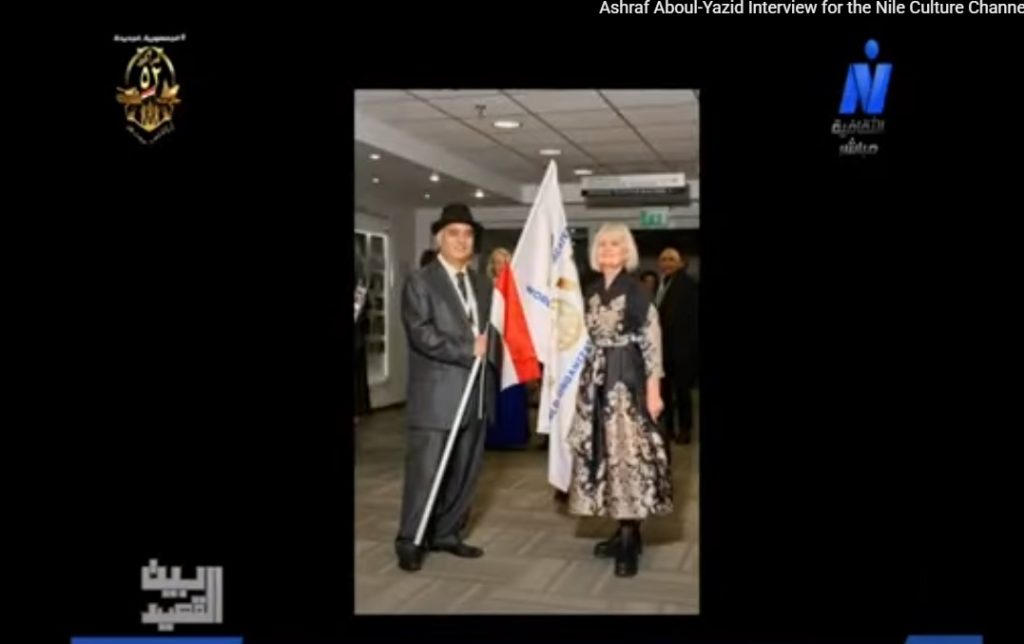
The Eurasian Literature Festival and the World Organization of Writers
He recalled first winning the Eurasian Literature Festival Gold Medal in 2021, before the prize evolved into the awards of the World Organization of Writers. Tradition dictated that each subsequent edition be hosted in the country of the latest laureate—thus the festival moved from Istanbul to Cairo, then to Abuja, and now to Moscow, celebrating Dr. Alexandra Ochirova.
This year the awards were announced in multiple languages, with proposals to hold the next edition in Brazil, China, or Indonesia, as poets from these countries were among the winners. He emphasized Dr. Ochirova’s keen interest in the role of media, noting their joint pursuit of “journalists of the future” who dream and plan for peace and development.
In 2023, on Egyptian television, poet and artist Margarita Al announced the founding of the World Organization of Writers following the signing of its founding charter. It was officially established in Moscow the following year, held its first congress in Abuja, and this year convened its second in Moscow.
The program broadcast scenes from WOW’s events, which gathered writers from 63 countries, as well as glimpses from the World Public Assembly, which drew four thousand participants, and from the Cairo edition of the Eurasian Festival.
Between Biography and Children’s Literature
In closing, Aboul-Yazid spoke of his engagement with biography, having edited the memoirs of Sheikh Mustafa Abdel Raziq in two volumes: Memoirs of a Traveler (UAE, 2004) and Sheikh Mustafa Abdel Raziq: Traveler and Resident (Egypt, 2005). He also highlighted his book The Frolic of Youth (Bibliotheca Alexandrina), documenting issues of Al-Shabab, the satirical magazine published by Bayram al-Tunisi during his exile.
On writing for children, he mentioned his works: The Story of an Artist Five Thousand Years Old (2005), My Cat Writes a Book (2021), and My Father the Mapmaker (2025). He stressed that science is the common thread in addressing young readers, adding: “Writing for children is harder than writing for adults; it demands a careful language and thoughtful engagement.”
Experiences in Translation and Poetry
He also shared some of his experiences with translated poetry: Iranian poet Nasrin Shakibi Momtaz translated three of his collections into Persian directly from the Arabic texts. Turkish poet Metin Fındıkçı translated his poems from Arabic, having also translated works by Adonis and Mahmoud Darwish. Spanish translations by Dr. Nadia Gamal El-Din were based on the Arabic originals, and published in Costa Rica.
Other translations were derived from the English editions first published in India, which later reached Sindhi, Urdu, Malayalam, Russian, German, Serbian, and Azerbaijani. Beyond poetry, his novels have been translated into Korean, English, and Malayalam. “The essence of translating poetry,” he noted, “is lived experience. My stay in Korea and conversations with its poets helped me render three Korean collections into Arabic.”
The Organic Intellectual and Travel Writing
Aboul-Yazid reflected on the role of the writer as an organic intellectual, not confined to creativity alone. He cited the Silk Road Anthologies, which gathered poets worldwide under shared themes: Asia Sings, Mediterranean Waves, and Ancient Egyptians, Modern Poets, where writers from around the globe penned poems about Egyptian civilization and figures such as Cleopatra and Akhenaten. The most recent volume, Nano Poems for Africa, united over 150 poets from 50 countries to voice a collective ode to the continent.
He explained that such endeavors led to his selection for cultural and media positions, recognizing his efforts to unify creativity across continents, his promotion of Eurasian literature, his authorship of the Silk Road Encyclopedia (Bibliotheca Alexandrina), and his advocacy for the finest poets and writers of Eurasia through anthologies and publications.
Finally, the conversation turned once more to travel literature. Aboul-Yazid expressed his joy at being called “the modern-day Ibn Fadlan” in Tatarstan, and reflected on his journeys:
“I had once dreamed of lingering as a dreamer by the Nile; instead I became a river in motion, traveling to the rivers of the world.”



